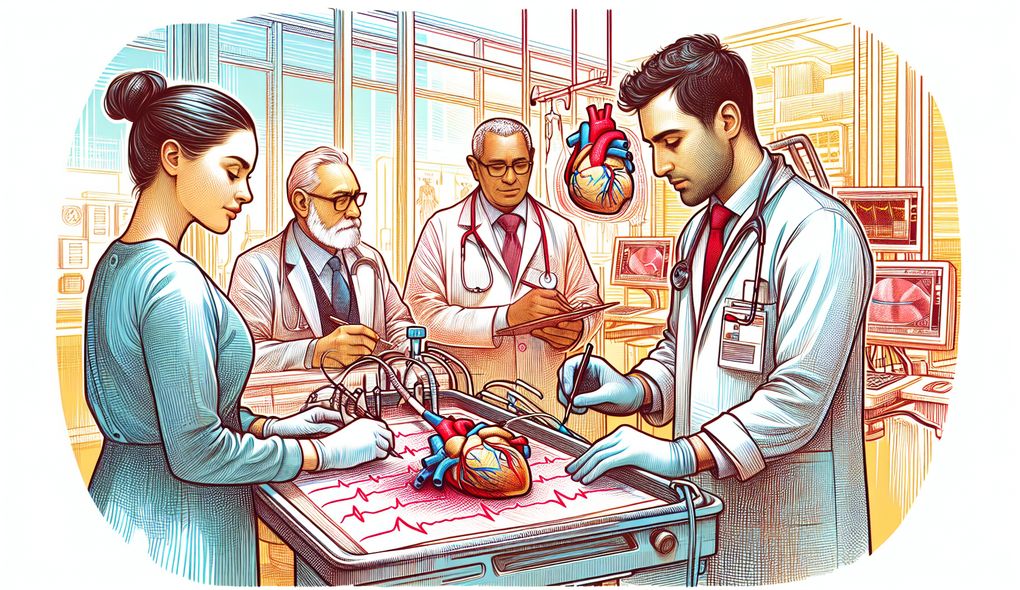Can you describe a situation where you had to make a difficult decision during an interventional procedure?
JUNIOR LEVEL

Sample answer to the question:
During a recent interventional procedure, I encountered a difficult decision. The patient had multiple blockages in their coronary arteries, and while performing the angiogram, I discovered that one of the blockages was particularly critical. The patient's condition was deteriorating rapidly, and immediate intervention was required. I had to quickly assess the risks and benefits of performing a complex procedure to open up the blockage. After carefully weighing the options, consulting with my team, and considering the patient's overall health, I made the difficult decision to proceed with the procedure. It was a high-stress situation, but the outcome was successful, and the patient's condition improved significantly.
Here is a more solid answer:
I would like to share a situation where I had to make a difficult decision during an interventional procedure. The patient presented with severe blockages in multiple coronary arteries, which required immediate intervention. However, during the angiogram, I discovered that one of the blockages was critical and posed a significant risk to the patient's life. This put me in a challenging position where I had to consider the risks and benefits of proceeding with a complex procedure to open up the blockage. I consulted with my team, carefully assessed the patient's overall health, and communicated with the patient's family to ensure they understood the situation. After a thorough evaluation, I made the difficult decision to proceed with the procedure, knowing that it was the best chance of saving the patient's life. Despite the high-stress environment, my strong clinical skills, ability to work under pressure, excellent decision-making, and effective communication skills allowed me to successfully navigate the situation and ultimately improve the patient's condition.
Why is this a more solid answer?
The solid answer provides a more comprehensive description of the situation and includes specific examples and details that demonstrate the candidate's skills and abilities. It also emphasizes the candidate's ability to work under pressure and make critical decisions.
An example of a exceptional answer:
I vividly recall a challenging situation during an interventional procedure that required me to make a difficult decision. The patient, a middle-aged individual, had a complex cardiac history with multiple blockages in their coronary arteries. During the angiogram, I observed one particular blockage that was severely critical and jeopardizing the patient's life. The decision-making process intensified as I meticulously examined the patient's anatomy and evaluated the risks and benefits of different interventions. Collaboration with my team and consulting with distinguished cardiologists further validated my path forward. I reached out to the patient's family and ensured they comprehended the gravity of the situation, answering their questions and addressing their concerns with empathy and transparency. After an intense assessment, I made the crucial decision to proceed with a complex percutaneous coronary intervention (PCI) to restore blood flow and save the patient's life. Throughout the high-stress procedure, my strong clinical skills, ability to remain calm under pressure, and effective communication skills were instrumental in guiding the team and ensuring the patient's well-being. The successful completion of the procedure resulted in a significant improvement in the patient's condition and a positive prognosis for their future cardiovascular health.
Why is this an exceptional answer?
The exceptional answer goes into significant detail about the specific situation and showcases the candidate's expertise and abilities. It includes specific examples, demonstrates strong clinical skills, the ability to work under pressure, excellent decision-making, and effective communication skills. The answer also highlights the candidate's empathy and transparency when communicating with the patient's family.
How to prepare for this question:
- Review and refresh your knowledge and skills in interventional cardiology, particularly in complex procedures and decision-making.
- Familiarize yourself with real case studies, especially those involving difficult decisions during interventional procedures, to gain insights into different approaches and considerations.
- Develop a strong understanding of patient communication, including empathetic and transparent communication when discussing critical situations and treatment options.
- Practice decision-making in high-stress environments by simulating scenarios or participating in case discussions with colleagues.
- Stay updated with the latest advancements and research in interventional cardiology to broaden your knowledge base and improve your decision-making abilities.
What are interviewers evaluating with this question?
- Strong clinical skills
- Ability to work under pressure
- Excellent decision-making
- Good communication skills

